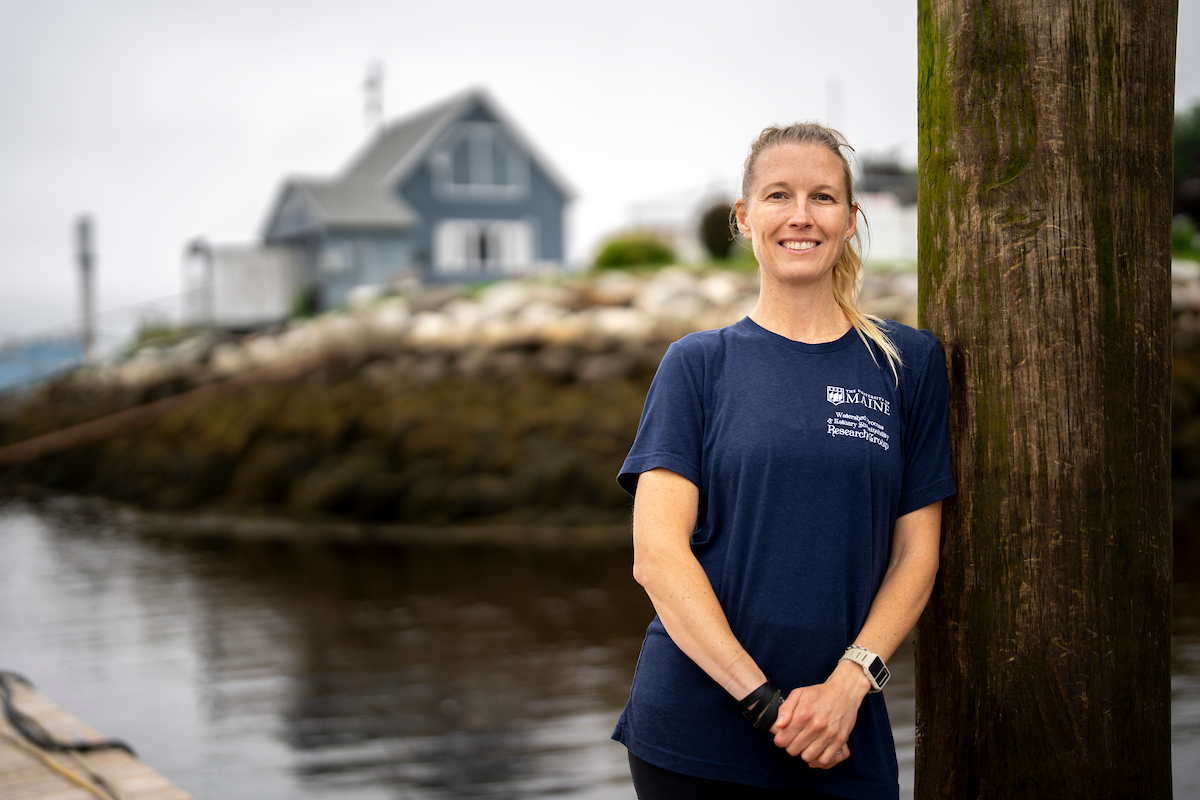
UMaine Tackles Coastal Resilience Challenges on a Global Scale
The Maine College of Engineering and Computing (MCEC) strives to solve some of the world’s most pressing coastal challenges, from rising sea levels to hazardous algae blooms. Nine researchers from the University of Maine attended the Physics of Estuaries and Coastal Seas (PECS) conference in Bordeaux, France, presenting their research alongside top international scientists and exploring new solutions for safeguarding coastal ecosystems in Maine and beyond.
Led by Lauren Ross, associate professor of civil and environmental engineering at UMaine and co-host of the conference, the delegation highlighted MCEC’s commitment to solving real-world challenges through research. They also showcased students who work alongside world-class faculty to understand and protect Maine’s unique coastline—one of the most complex in the world.
Maine; A living laboratory for coastal research
Maine’s rugged coast and extreme tides offer an ideal natural laboratory for studying coastal processes and how they are impacted by climate change. UMaine’s focus on the blue economy capitalizes on this setting, advancing critical problem-solving for Maine and coastal communities worldwide that face similar challenges. Rising sea levels, storm surges, pollution and changes in river flows all put immense pressure on coastal ecosystems and the industries that depend on them.
Coastal ecosystems in Maine are particularly vulnerable to these disruptive forces. The state’s economy relies heavily on industries like aquaculture and coastal tourism which NOAA estimates supports 49,000 jobs who earn more than $2.3 billion annually. These industries face growing risks from issues such as storm-driven surges, declining water quality and hazardous algae blooms. Understanding how coastal systems respond to these stressors is key to ensuring their resilience and long-term sustainability.
Global knowledge creates local impact
A major focus of research centers on the way tides, storm surges and river flows converge during extreme weather events, potentially creating more powerful and destructive impacts than any one of these forces alone. Kimberly Huguenard, associate professor of civil and environmental engineering and faculty advisor at PECS conference, presented on this subject, noting that understanding how these forces interact will improve predictive models that can help coastal communities prepare for and mitigate damage from storms and flooding.
Other research by Elias Pinilla, a Ph.D. student in civil and environmental engineering at UMaine, focuses on how drought conditions reduce freshwater flow into coastal ecosystems, creating nutrient-rich environments that fuel hazardous algae blooms. These blooms can devastate marine life and threaten industries like aquaculture, a rapidly growing sector in Maine. Advised by Ross, Pinilla’s research aims to predict how these ecosystems will respond to changing freshwater inflows, providing policymakers with critical data to manage these threats.
MCEC students and faculty built global connections that enhance their work at home. Ross shared that conversations with Chilean researchers revealed how Maine’s aquaculture industry can avoid some of the challenges once faced by Chile’s farmers of the sea. “Maine is where Chile was 40 years ago in terms of aquaculture,” Ross said. “Learning from their experience can help us avoid some of the challenges they faced and position Maine’s aquaculture industry for long-term success.”
Training the next generation of coastal scientists
MCEC leverages research to provide students opportunities to engage in and help address global challenges. Ph.D. student Nalika Lakmali studies the Penobscot River’s extreme tidal dynamics, positioning her to contribute to critical research that could influence how coastal systems are managed around the world.
Students like Lakmali and Pinilla work alongside faculty members to explore new ideas, develop innovative methodologies and present their findings to international audiences. MCEC’s research and education initiatives cultivate a sustainable future for Maine’s coastline and beyond. As students and faculty work together to find solutions to some of the most complex challenges facing coastal ecosystems today, MCEC is strengthening its role as a leader in coastal research, not just in Maine, but on the global stage.
UMaine presentations at the conference included:
- Bailey, Taylor*, Lauren Ross, Cristian Rojas*. Residual Flow in a Deglaciated Coastal Bay with Low Freshwater Input
- Rojas, Cristian*, Lauren Ross, Aldo Sottolichio, Marvin Lorenz, Hans Burchard, Spatial-temporal variability of total exchange flow and mixing in a macrotidal and well-mixed estuary.
- Pinilla, Elias*, Lauren Ross, Ivan Perez-Santos. Exchange flow in a highly stratified fjord system.
- Pinilla, Elias*, Arnoldo Valle-Levinson, Cristian Rojas*, Debora Barros*, Ivan Perez-Santos, Lauren Ross. Tidal and subtidal dynamics at the toe of a salt wedge estuary: The Penobscot River.
- Van Dam, B. and S.M.C. Smith. Diagnostic tool development for assessments of coastal pollution vulnerability.
- Smith, S.M.C., D. Libby, B. Van Dam. Sediment entrainment vulnerability at the confluence of nontidal streams and tidal estuaries. Physics of Estuaries and Coastal Seas, 24 September 2024, University of Bordeaux, Bordeaux, France.
Special thanks to the Harold Alfond Foundation and UMS TRANSFORMS for supporting the researchers’ work in coastal resilience challenges and their travel to the PECS conference.
Contact: Taylor Ward, taylor.ward@maine.edu
